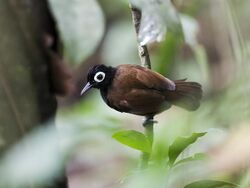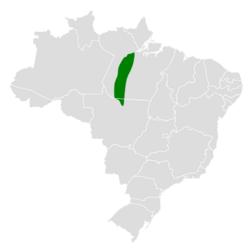Biology:Bare-eyed antbird
From HandWiki
Short description: Species of bird
| Bare-eyed antbird | |
|---|---|

| |
| Scientific classification | |
| Domain: | Eukaryota |
| Kingdom: | Animalia |
| Phylum: | Chordata |
| Class: | Aves |
| Order: | Passeriformes |
| Family: | Thamnophilidae |
| Genus: | Rhegmatorhina |
| Species: | R. gymnops
|
| Binomial name | |
| Rhegmatorhina gymnops Ridgway, 1888
| |

| |
The bare-eyed antbird (Rhegmatorhina gymnops), occasionally known as the Santarem antbird, is a species of insectivorous passerine bird in the antbird family, Thamnophilidae. It is endemic to Brazil . Its natural habitat is subtropical or tropical moist lowland forests.
The bare-eyed antbird was formally described by the American ornithologist Robert Ridgway in 1888 and given the binomial name Rhegmatorhina gymnops.[2]
This species is a specialist ant-follower that depends upon swarms of army ants to flush insects and other arthropods out of the leaf litter.[3][4]
References
- ↑ BirdLife International (2016). "Rhegmatorhina gymnops". IUCN Red List of Threatened Species 2016: e.T22701907A93854116. doi:10.2305/IUCN.UK.2016-3.RLTS.T22701907A93854116.en. https://www.iucnredlist.org/species/22701907/93854116. Retrieved 17 November 2021.
- ↑ Ridgway, Robert (1887). "Descriptions of new species and genera of birds from the Lower Amazon". Proceedings of the United States National Museum: 516–528 [525]. https://biodiversitylibrary.org/page/7485705. Although the title page gives the year as 1887, the volume was not published until 1888.
- ↑ Zimmer, K.; Isler, M.L. (2018). "Typical Antbirds (Thamnophilidae)". in del Hoyo, J.; Elliott, A.; Sargatal, J. et al.. Handbook of the Birds of the World Alive. Lynx Edicions. https://www.hbw.com/node/52291.
- ↑ Willis, Edwin O. (1969). "On the behavior of five species of Rhegmatorhina, ant-following antbirds of the Amazon basin". Wilson Bulletin 81: 362–395. https://sora.unm.edu/sites/default/files/journals/wilson/v081n04/p0363-p0395.pdf.
Wikidata ☰ Q844201 entry
 |


